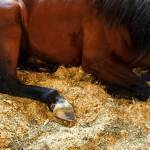Right Dorsal Colitis in Horses: Role of Bicarbonate in Etiology

Right dorsal colitis is an ulcerative disease of the large intestine often brought about by excessive use or prolonged administration of nonsteroidal anti-inflammatory drugs (NSAIDs). While phenylbutazone, commonly called bute, is most often associated with right dorsal colitis, other drugs can cause this syndrome, including flunixin meglumine (Banamine) and meloxicam.*
A recent study investigated the link between bicarbonate secretion in the colon and the effect of phenylbutazone on this secretion, potentially linking right dorsal colitis to cystic fibrosis in humans.+ “Secretion of bicarbonate in the right dorsal colon could protect mucosa from injury caused by intense microbial production of short-chain fatty acids,” according to the researchers involved in the study. Production of short-chain fatty acids, also called volatile fatty acids, is completely normal in the hindgut, and volatile fatty acids serve as a key energy source for horses.
Researchers harvested tissue samples from the right dorsal colon and right ventral colon of 10 horses during surgery to measure bicarbonate secretion. The effect of phenylbutazone on bicarbonate secretion was studied in four of the 10 horses. They found that the dorsal colon typically has more bicarbonate secretion than the ventral colon, and that phenylbutazone significantly reduced bicarbonate secretion, leaving the tissues vulnerable to damage.
“Secretion of bicarbonate was considerably greater in the right dorsal colon than the right ventral colon and involved different transport mechanisms,” explained the researchers. “The primary transporter of bicarbonate in the right dorsal colon was consistent with cystic fibrosis transmembrane conductance regulator (CFTR), the failed transporter in human cystic fibrosis. In the right dorsal colon, bicarbonate secretion was decreased by phenylbutazone use, probably through inhibition of CFTR.”
Cystic fibrosis in humans, a genetic condition that causes respiratory and digestive issues, is also associated with a bicarbonate deficiency. People with cystic fibrosis have intestinal lesions similar to those observed with right dorsal colitis in horses.
Supplementation of horses with EquiShure, a protected form of sodium bicarbonate, could discourage the conditions necessary for right dorsal colitis to develop, postulated Peter Huntington, B.V.Sc., M.A.C.V.Sc., director of nutrition at Kentucky Equine Research. This is especially important for those horses that require nonsteroidal anti-inflammatory therapy often, such as high-performance horses.
“Normal bicarbonate will be inactivated in the stomach and small intestine, but EquiShure delivers sodium bicarbonate to the hindgut to help minimize pH fluctuations associated with modern feeding practices,” Huntington said. “We know the EquiShure is incredibly effective at mitigating hindgut acidosis and microbiota dysbiosis, but it could have more far-reaching benefits for horses on phenylbutazone and other NSAIDs.”
*Davis, J.L. 2017. Nonsteroidal anti-inflammatory drug associated right dorsal colitis in the horse. Equine Veterinary Education 29(2):104-113.
+Bauck, A.G., and D.E. Freeman. 2022. Right dorsal colitis: Is this similar to cystic fibrosis in people? In: Proc. American Association of Equine Practitioners 68:241-242.








